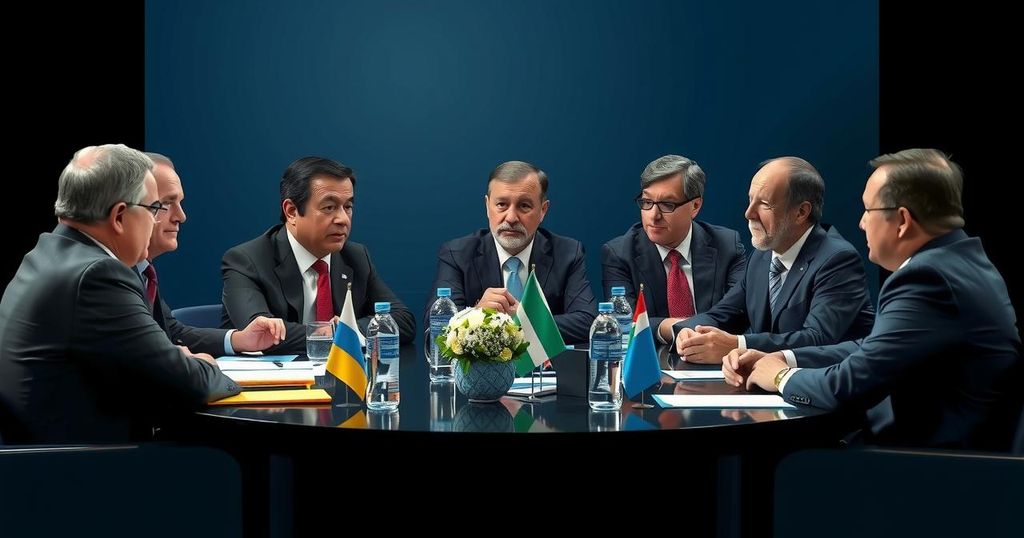Global news
AFP, ANTONIO GUTERRES, ASIA, AZERBAIJAN, BIDEN, BILATERAL TALKS, BRAZIL, DONALD TRUMP, FOREIGN MINISTRY, FOREIGN POLICY, G20, GEOPOLITICS, INTERNATIONAL RELATIONS, JOE BIDEN, LIMA, LU, LUIZ INACIO LULA DA SILVA, LUIZ INÁCIO LULA DA SILVA, NORTH AMERICA, OF 20, PERU, RIO DE JANEIRO, SOUTH AMERICA, TRUMP, UN, UNITED STATES, WHITE HOUSE, XI JINPING
Leila Ramsay
0 Comments
G20 Summit in Brazil Tackles Major Global Challenges Amid Political Shifts
The G20 summit in Brazil is addressing major global challenges, including conflicts in the Middle East and Ukraine, climate change, and the implications of Donald Trump’s electoral victory. While discussions aim to promote collaboration, deep divisions among member states could impede meaningful agreements. Brazilian President Lula promotes domestic concerns like poverty and taxation, while the urgency of climate finance continues to be a pressing agenda item. Security protocols have been heightened in light of recent events, and President Biden aims to bolster his climate legacy during this summit, potentially his last as U.S. president.
Leaders from the G20 began their summit in Rio de Janeiro, Brazil, aiming to address pressing global issues such as conflicts in the Middle East, the Ukraine war, climate change, and the implications of Donald Trump’s recent electoral success. The summit, taking place over two days, is expected to encounter challenges in reaching a significant consensus due to existing geopolitical tensions. Brazilian President Luiz Inácio Lula da Silva has emphasized domestic issues, particularly hunger and taxation of the wealthy, while US President Joe Biden is anticipated to make his final appearance as president, overshadowed by Chinese leader Xi Jinping’s growing influence. Discussions are likely to center around the ongoing wars that divide member countries, with Brazil seeking to finalize a draft communiqué amid calls for amendments from certain nations. Biden’s policy shift allowing Ukraine to strike targets in Russia could lead European allies to reevaluate their positions. In addition, there is a pressing call for action regarding international climate finance as UN climate talks remain stalled, with Secretary-General Antonio Guterres urging G20 members—who contribute to 80% of global emissions—to display leadership. Security measures have been heightened following a recent bomb attempt targeting Brazil’s Supreme Court. President Biden is keen to secure a legacy focused on climate initiatives, emphasizing the necessity of tackling poverty alongside conflict. While progress was made at the previous G20 meeting in India concerning renewable energy, there remains a notable absence of commitment to phase out fossil fuels. Amid these discussions, Russian President Vladimir Putin is notably absent due to an International Criminal Court arrest warrant.
The G20 summit represents a critical gathering of the world’s major economies, focusing on significant geopolitical issues at a time of heightened global tensions due to various conflicts and climate crises. As nations grapple with the implications of leadership changes, such as Donald Trump’s potential return to power, the pressures surrounding international relations and cooperative efforts in areas like climate change and military conflicts take center stage. This summit seeks to facilitate dialogue on diverging interests while fostering collaboration on pressing global issues. Furthermore, Brazilian President Lula’s agenda aims to address socio-economic issues, including wealth disparity and hunger, reflecting broader concerns among developing nations regarding poverty and environmental sustainability, which have been exacerbated by conflicts and climate change.
In conclusion, the G20 summit in Rio de Janeiro serves as a pivotal platform for world leaders to address critical issues, including ongoing global conflicts, significant geopolitical shifts, and urgent climate challenges. While there is a strong call for collaboration and consensus, the underlying divisions among member states may hinder substantial progress. Brazilian President Lula’s focus on poverty and taxation further highlights the broader themes of economic inequality that permeate the discussions. As the summit unfolds, the outcomes will likely influence global diplomatic and environmental strategies moving forward.
Original Source: www.france24.com




Post Comment